Daily Trojan Magazine
Playing with pride
Queer athletes and fans discuss what Pride Month means to them.
Queer athletes and fans discuss what Pride Month means to them.
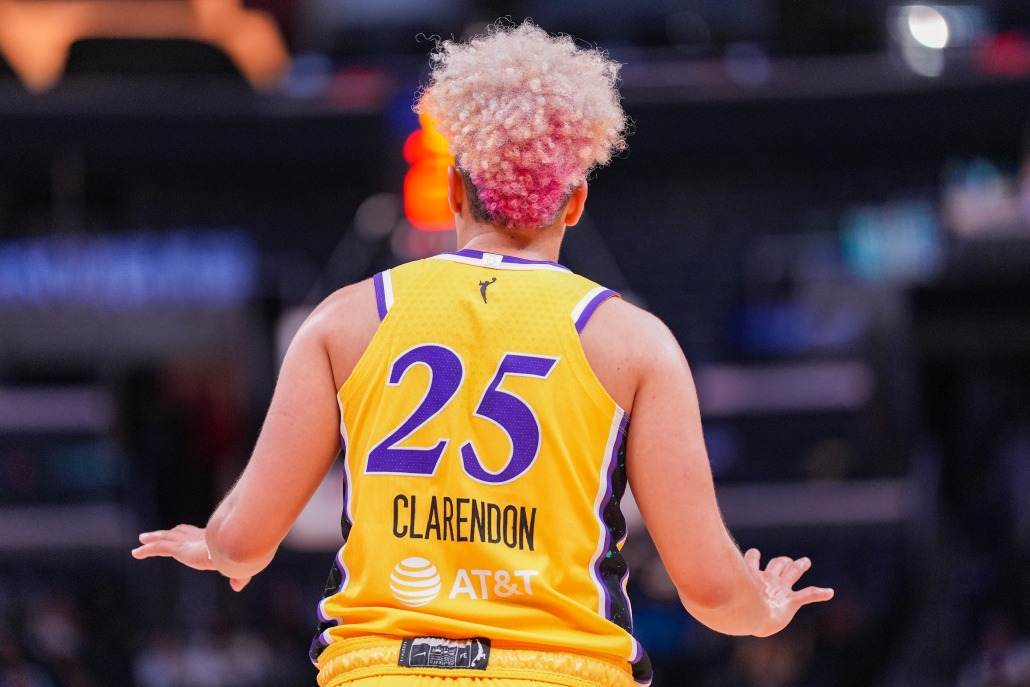
On June 3, Maggie Ramsay — a rising junior on the USC women’s lacrosse team — spoke in a prerecorded message about the importance of safe spaces for queer joy as a part of the USC Pride Month Kickoff celebration. However much like other athletes in this piece, Ramsay is more than that 50-second video.
Ramsay grew up in Darien, Connecticut — a town she called a “homophobic” and “very white privilege place.” She played several sports in high school — soccer, basketball and lacrosse — before committing to USC for the latter. She said she chose USC to follow her older sister, Katie, who was also on the team — but also to escape to an environment where she knew she would be supported.
“I knew how accepting my [USC] coaching staff was,” Ramsay said in an interview with the Daily Trojan. “When I was doing all that stuff my senior year of high school, they reached out to me, told me how proud of me they were … My sister committed when I was in sixth grade, and I kind of decided that day that I was going to follow in her footsteps and try to make it happen.”
Another reason Ramsay was intent on leaving for Los Angeles was around the time she committed to USC in her junior year of high school, Ramsay had been outed as gay and was facing harassment from her peers.
“The f-slur was thrown around at me a bunch in school, out of school,” Ramsay said. “I had parents who said to their kids, ‘I don’t really want you hanging around Maggie anymore,’ just because I was gay. I’ve had drinks poured on my head.”
Ramsay said she had to leave friend groups composed of athletes who turned against her after being outed. But she found better friends who accepted her and would help her advocate for herself and others. Since she was in high school, Ramsay has spoken at board of education and select board meetings to advocate for better treatment of queer students in the area, as well as related issues.
The first athlete on a professional “team sport” in the United States did not come out until around 50 years ago. David Kopay, who had played for five NFL teams, came out during an interview with The Washington Star in 1975 — three years after he had retired. Glenn Burke, a former Los Angeles Dodger and Oakland Athletic known for popularizing the high-five during his career in the ’70s, came out during an interview in 1993.
More athletes participating in solo sports have come out in the late 1900s. Martina Navratilova, a Czech American tennis player, came out as bisexual in 1981. Though she subsequently faced discrimination from potential sponsors, she remained outspoken on queer issues and went on to win 167 singles tennis tournaments. Another tennis great, Billie Jean King, who recently spoke at the Annenberg School for Communication and Journalism’s commencement ceremony, was outed that same year.
In recent years, the prevalence and coverage of queer athletes in all sports has grown. The 2020 Tokyo Summer Olympics (which occurred in 2021) included the first out transgender and nonbinary Olympians, and in November 2021, the International Olympic Committee issued new guidelines protecting LGBTQIA+ athletes, including directions for governing sports bodies to fairly construct future competitions to limit discrimination based on gender identity.
Carl Nassib, then a defensive end for the Las Vegas Raiders, became the first active NFL player to come out as gay in 2021. That same year, then-Nashville Predators prospect Luke Prokop became the first openly gay player in NHL history. Sue Bird and Megan Rapinoe, titans in their respective sports of basketball and soccer, have been openly together since 2017.
Zach Herrin, a NASCAR driver, grew up in a family of motorsports. His father picked it up as a “weekend hobby,” but it quickly became the driving force behind his and his brother’s careers. Herrin said in an interview with the Daily Trojan that he began riding motorcycles at the age of 5 and made a professional debut at 16.
Unfortunately for him, he would soon step back from racing for the next 10 years. Herrin left professional racing when he came out to his friends and family because he felt that he couldn’t balance growing into his true self with staying in a sport that he said wasn’t very accepting in an interview with The Advocate.
“I felt like my career was, in a way, taken from me,” he said. “[I was] just struggling mentally with not finding acceptance in hiding my true personality than a sport that I loved for so many years. It was the hardest time.”
Nearly a decade later, in November 2022, Herrin returned — though he faced a renewed challenge: getting funds. With few sponsors or other sources of money, Herrin found it hard at first to race as much as he wanted.
“If you [are a] driver who has family or personal funding, you can have a career,” he said. “If you don’t have that, you need corporate sponsorship. For someone like me, who currently has neither, it’s almost impossible.”
Herrin hopes as companies are increasing their sponsorships of queer events and initiatives, they will break into the motorsport realm and work with him.
In the meantime, Herrin is happy with the progress that NASCAR is making in terms of allyship. Specifically, he praised the company Ally — also a major sponsor for Angel City F.C. — for being a driving force in putting together NASCAR’s Pride events and sponsoring a car on the track. The car, driven by Alex Bowman, was part of NASCAR powerhouse Hendrick Motorsports, which had another one of its cars take first place at the June 10 Sonoma race where the Ally car also drove.
“I’ve been manifesting and obviously doing a lot of work side by side with them this year,” Herrin said. “One day [I’ll] have an Ally car with my name on it, we’ll see.”
And as for discrimination on or off the road, Herrin said he hasn’t seen as much as some might think. He said those who may have a problem simply see themselves out.
“There’s not that much hate,” he said. “There’s been a lot of headlines in the past that [paint] that picture, but it’s really changing and evolving. And as one side of the country continues to evolve with this whole cancel culture thing and ‘we don’t approve of this,’ they just eliminate themselves and then new people have more room to come in and grow together.”
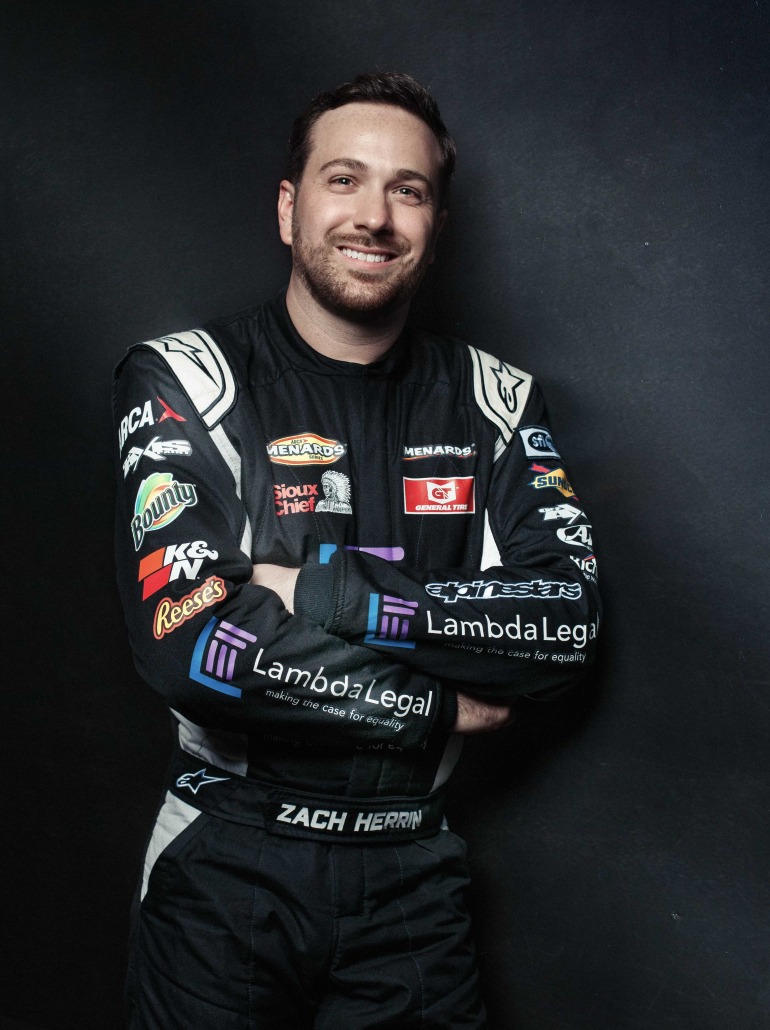
More recently, the WNBA has seen progress. Layshia Clarendon, a guard for the Los Angeles Sparks as well as the first WNBA player to come out as transgender and nonbinary, told the Daily Trojan that the league’s efforts to celebrate pride have been appropriate and uplifting. Incidentally, one of Clarendon’s former coaches is current USC women’s basketball Head Coach Lindsay Gottlieb.
“It’s very reflective of the WNBA, of the people in this league,” said Clarendon, who is also the first active WNBA player to have gotten top surgery. “It’s amazing to see, especially in this moment in time where there’s so many anti-trans bills or so much legislation around trying to exclude the queer community, specifically trans people from being in sports. So it means a lot, but it’s kind of a no-brainer for your org to support people.”
After WNBA league play began in 1997, it took a few years for the first athlete — Sue Wicks of the New York Liberty in 2002 — to come out. Slowly, the league became more and more outwardly accepting. In 2014, it became the first professional sports league to announce a yearly pride campaign featuring a televised pride game. By 2017, an article by “Just Women’s Sports” notes, it was no longer an “expectation” for players to announce their sexuality — and the league continues to evolve.
In 2022, one year after their own gender-affirming surgery, Clarendon started the Layshia Clarendon Foundation, which aims to provide those in need with “access to life affirming healthcare and wellness services” through a number of methods, including financial support and education.
With a love for their community both on and off the court, Clarendon said in their interview with the Daily Trojan that queer aspiring athletes should be able to have the “beautiful” experience of being on a team, especially one that is welcoming.
“Don’t miss out on the beautiful opportunity to be a part of a team,” they said. “Care about your safety and your wellness with choosing when to come out and making sure you have people around you that will support you, that’s the most important thing. But for me, basketball has been one of the safest places and the places that have given me so much community and joy with other people.”
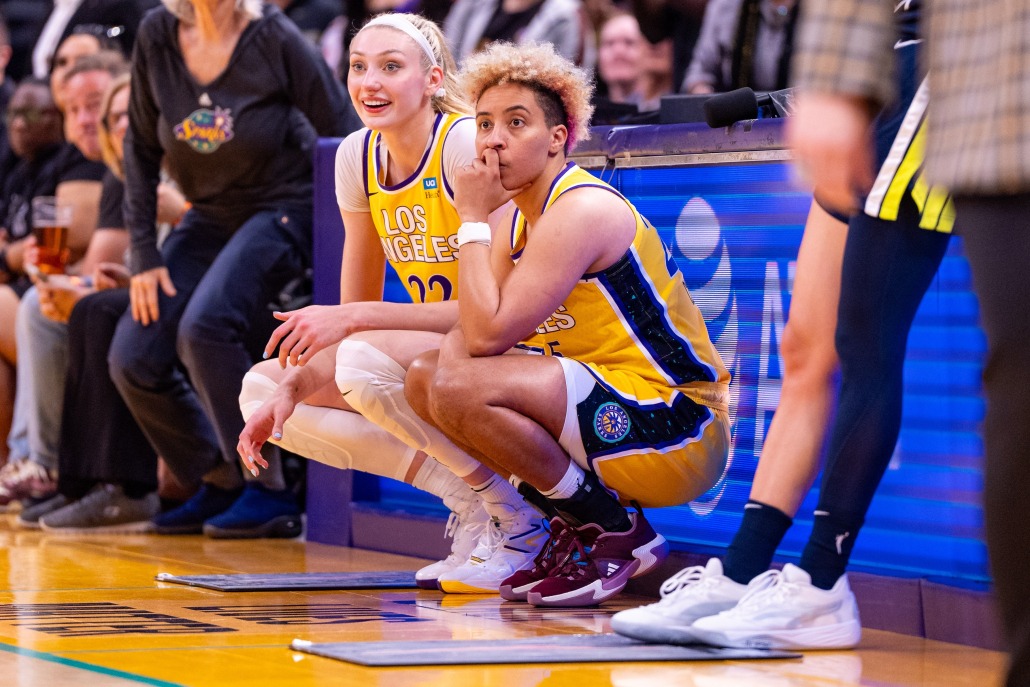
Major league teams around the country have begun holding “Pride nights” in June to celebrate the queer community and queer athletes. Though some have experienced controversy — such as a Dodgers LGBTQ+ Pride Night in 2023, which faced backlash when the Dodgers initially caved to calls from Catholic groups to exclude a charity group of queer nuns in drag — queer fans are generally pleased with the opportunity to celebrate themselves.
Brittany Shaw, a longtime supporter of Angel City F.C., appreciates the fact that the women’s soccer community is generally very welcoming to queer fans and players. Though she did not specifically attend a Pride night, rainbow flags could be seen throughout the stadium and she herself was decked out in rainbow-clad gear.
“Women’s soccer, it’s very queer,” Shaw said. “It’s very pro-LGBTQ+, it’s very welcoming. It’s a great place, and you see a lot of families, a lot of kids and it’s just really special because everyone accepts everyone as they are.”
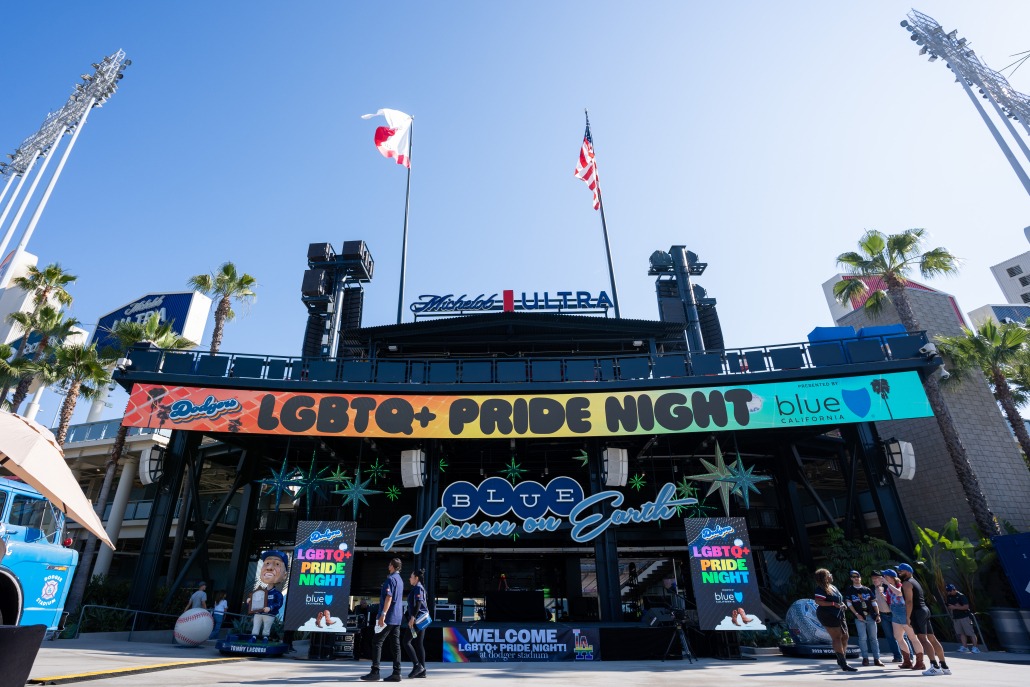
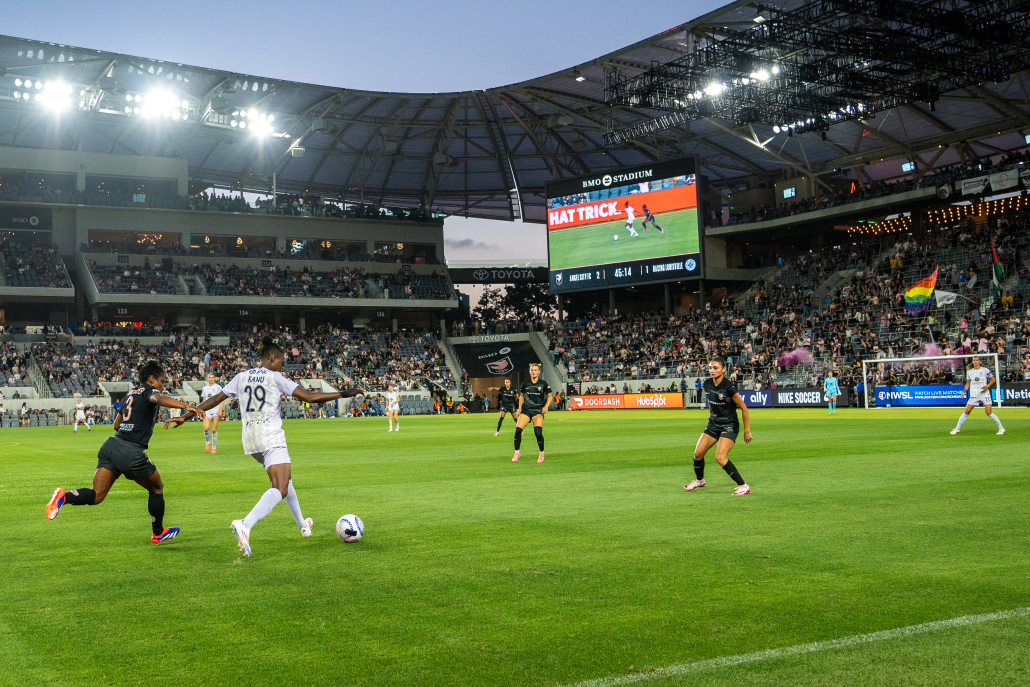
Back at USC, Ramsay majors in political science — which she said she chose because of her life in Darien. She is also the co-president of the University’s chapter of Athlete Ally, a nationwide organization for queer athletes. Ramsay said Julie Rousseau, the associate athletic director in charge of diversity, equity and inclusion at USC, helped her to start the USC chapter within the last year. Before establishing the chapter, Ramsay went to a summit for the organization, which she described as an incredible experience.
“We [were] surrounded by other queer athletes,” she said. “I’ve never felt so safe, and I’ve made so many friends at this place.”
Since its recent creation, the USC chapter has amassed around 25 student-athletes and held a few successful bonding events, such as a dodgeball game and an ice cream social.
“It was nice to get to meet other queer athletes,” she said. “I obviously knew some just from the dining hall, but when you are on a team you mostly spend most of your time with your team. And so it’s really nice interacting with other athletes on different teams. I’ve loved it. It’s been an amazing experience.”
Ramsay said her teammates and coaches have continued to support her. They’ve donned Pride shirts to match ones her parents have worn and brandished rainbow sweatbands on National Coming Out Day.
“The constant support in my identity has always been here at USC, and that is something I so badly needed in high school, and I think it is needed everywhere. But I’m so lucky and so grateful to have it here at USC now,” she said.
Ramsay’s biggest supporter, however, is likely her mother, who she said she looks up to because of her fervent support of Ramsay and the community. Her mother has spoken at the same board meetings and offered words of comfort when a campaign hasn’t gone the way they wanted.
“The way that she fights for what she believes is right is just unbelievable,” Ramsay said. “She will invite her like-minded friends over, and they will sit at the kitchen table and write letters to people, urging them to vote … [to] overturn this flag policy [which prohibited the pride flag from being flown above the town hall], for example.”
For aspiring queer athletes, or anyone stuck in a tough situation, Ramsay has four words: “It does get better.”
“I’d wake up every day and be like, ‘It’s okay, you’re out of here soon, you’re out of here soon,’” she said. “It sucks that some people in some places, like myself in Darien, have to feel like that, but it does get better.”
She also praised sports for being her saving grace while she was still in Connecticut. Being a force on the field meant those who wanted her out had to admire her skill.
“It’s not easy growing up in a place where you’re not accepted, and it’s constantly shown, but I always felt like an equal on the sports field,” she said. “It was like, ‘Oh, if you’re good, you’re fine.’ And so I guess I just practiced my craft so that no one could say anything about me, because no one cared as long as I could do my job in the field, no one cared who I loved.”
Ultimately, Ramsay said her experience was worth going through because it showed her what authenticity means and made her even more proud to be the best version of herself.
“Even though I went through a lot when I came out, I don’t think I would ever change what happened to me,” she said. “I’ve loved getting to be the truest version of myself. I look in the mirror every day, and I’m happy with that, and I’m very proud of myself for getting to that spot, because I haven’t always been there. [Know] that it’s okay to not be there right now, but [know] that you will get there eventually and have that pride in yourself and then love yourself for every bit of your identity, whether that’s being an athlete, being queer, or anything in between.”
Bryce Dechert contributed to this report.
This site uses cookies. By continuing to browse the site, you are agreeing to our use of cookies.
Accept settingsDo Not AcceptWe may request cookies to be set on your device. We use cookies to let us know when you visit our websites, how you interact with us, to enrich your user experience, and to customize your relationship with our website.
Click on the different category headings to find out more. You can also change some of your preferences. Note that blocking some types of cookies may impact your experience on our websites and the services we are able to offer.
These cookies are strictly necessary to provide you with services available through our website and to use some of its features.
Because these cookies are strictly necessary to deliver the website, refusing them will have impact how our site functions. You always can block or delete cookies by changing your browser settings and force blocking all cookies on this website. But this will always prompt you to accept/refuse cookies when revisiting our site.
We fully respect if you want to refuse cookies but to avoid asking you again and again kindly allow us to store a cookie for that. You are free to opt out any time or opt in for other cookies to get a better experience. If you refuse cookies we will remove all set cookies in our domain.
We provide you with a list of stored cookies on your computer in our domain so you can check what we stored. Due to security reasons we are not able to show or modify cookies from other domains. You can check these in your browser security settings.
These cookies collect information that is used either in aggregate form to help us understand how our website is being used or how effective our marketing campaigns are, or to help us customize our website and application for you in order to enhance your experience.
If you do not want that we track your visit to our site you can disable tracking in your browser here:
We also use different external services like Google Webfonts, Google Maps, and external Video providers. Since these providers may collect personal data like your IP address we allow you to block them here. Please be aware that this might heavily reduce the functionality and appearance of our site. Changes will take effect once you reload the page.
Google Webfont Settings:
Google Map Settings:
Google reCaptcha Settings:
Vimeo and Youtube video embeds:
The following cookies are also needed - You can choose if you want to allow them:
